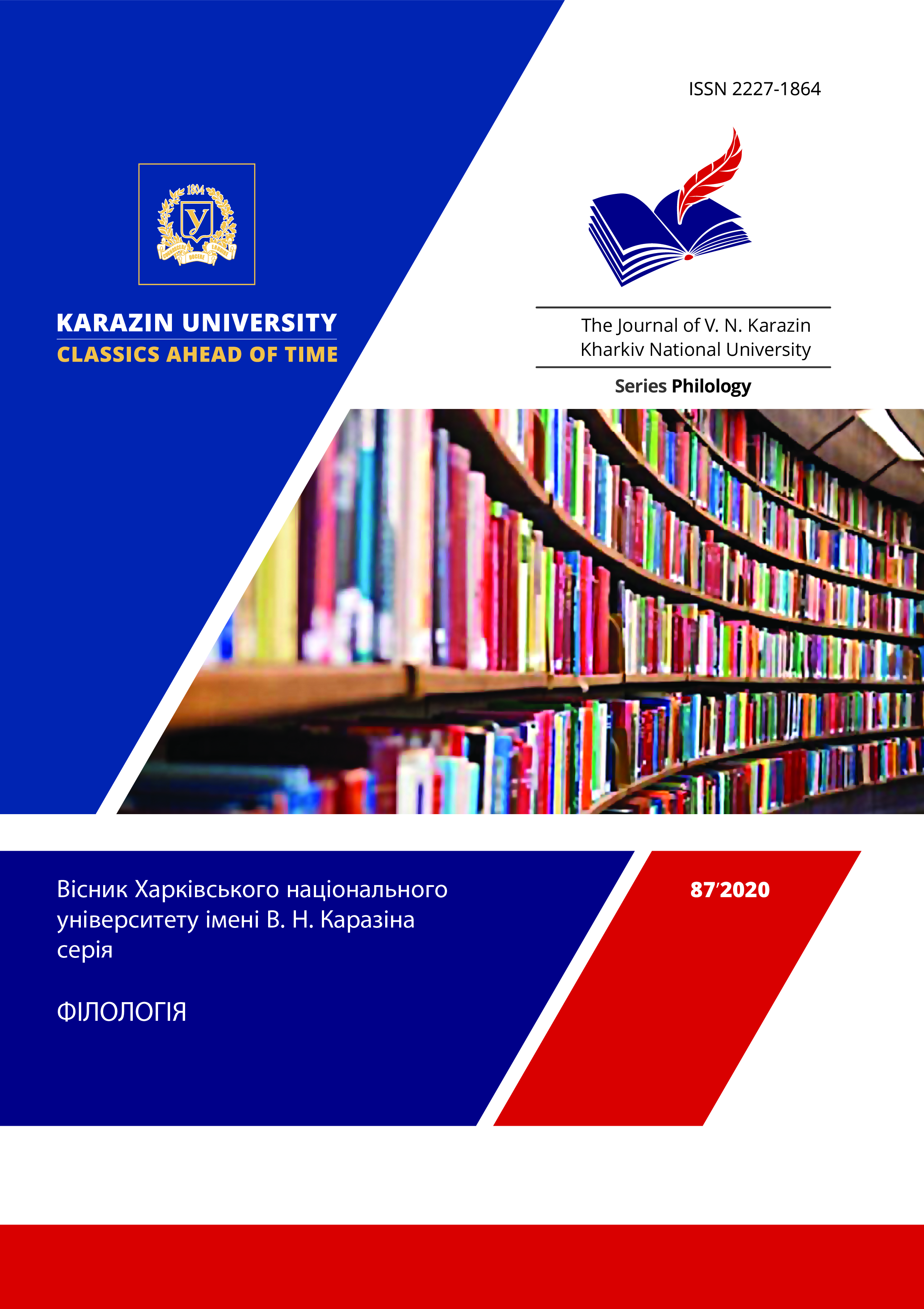Types of linguistic means of influence in the election programs of candidates for the post of the President of Ukraine: on the material of the 2019 elections
Abstract
The article analyzes the types of linguistic means of influence in the election programs of candidates for the post of President of Ukraine in 2019, used to establish or retain power and manipulate public consciousness and voter behavior. The following types of linguistic means of influence are distinguished: evaluative vocabulary, phraseological units, ideological clichés, metaphors, precedent phenomena, paraphrases, repetitions, gradation, rhetorical questions. It has been proven that evaluative vocabulary occupies a leading place among linguistic means of influence, creates a positive or negative assessment of an event or person. They attract attention and accurately express an emotionally expressive thought phraseological units, of which they have been modified. Ideological clichés are a means of stereotyping the voter's thinking. The emotionality of the presentation is greatly enhanced by the political metaphor. In the election programs of 2019, the following types of metaphors are recorded: a metaphor of illness, a metaphor of collapse, a metaphor of a prison, a metaphor of space, a metaphor of welfare. Indirect names in the programs turned out to be solitary, descriptive names – periphrases, as well as precedent phenomena. Repetition is a useful means of persuading and instilling ideas in voters, used to highlight the main thesis of the program, the depiction of problems that threaten voters. The use of gradation helps the politician to highlight the complexity of the existing problem and convey to the electorate that only this politician can solve it. A rhetorical question is another means of activating voters' attention, the main function of which is to induce voters to think and search for an answer to the question posed. Among the graphic means, the abnormal use of a capital letter to underline the most important lexeme (lexemes) and the use of quotation marks to change the nature of the assessment were recorded.
A characteristic feature of the linguistic content of election programs is the layering of several different types of linguistic means, which has an expressive manipulative effect, creates the desired impression, evokes appropriate thoughts and encourages voting.
Downloads
References
Bebyk, V. M. Politologiya dlya polityka i gromadyanyna. Retrievedfromhttp://politics.ellib.org.ua/pages-cat-72.html [in Ukrainian].
Vehesh, M. M. (2008) Politolohiia: pidruchnyk. 3 vyd., pererob. i dopovn. Kyiv: Znannia [in Ukrainian].
Zakon Ukrainy «Pro vybory Prezydenta Ukrainy» vid 05.03.1999. (1999) Vidomosti Verkhovnoi Rady Ukrainy. № 14. [in Ukrainian].
Kondratenko, N., Strii, L., & Bylinska O. (2019). Linhvoprahmatyka politychnoho dyskursu: typolohiia movlennievykh zhanriv: monohrafiia. In N. Kondratenko (Eds.). Odesa: Astroprynt [in Ukrainian].
Metodychnyi posibnyk z hromadianskoi osvity ta politychnoi prosvity. Retrieved from https://www.austausch.org/zanjattja-1-5 / [in Ukrainian].
Minchak, H. B. (2003) Konotatyvna semantyka suchasnykh ideolohichnozabarvlenykh nominatyvnykh odynyts (na materiali ukrainskoi presy 90-kh rokiv ХХ stolittia). Extended abstract of Doctor’s thesis. Kyiv [in Ukrainian].
Peredvyborcha prohrama Balashova H. V. (2019). Retrieved from https://www.cvk.gov.ua/pls/vp2019/wp005pt021f01=209pt001f01=719.html [in Ukrainian].
Peredvyborcha prohrama Bezsmertnoho R. P. (2019). Retrieved from https://www.cvk.gov.ua/pls/vp2019/wp005pt021f01=253pt001f01=719.html [in Ukrainian].
Peredvyborcha prohrama BohomoletsO. V. (2019). Retrieved from https://www.cvk.gov.ua/pls/vp2019/wp005pt021f01=211pt001f01=719.html [in Ukrainian].
Peredvyborcha prohrama Bohoslovskoi I. H. (2019). Retrieved from https://www.cvk.gov.ua/pls/vp2019/wp005pt021f01=236pt001f01=719.html [in Ukrainian].
PeredvyborchaprohramaBondaraV. V. (2019). Retrieved from https://www.cvk.gov.ua/pls/vp2019/wp005pt021f01=257pt001f01=719.html [in Ukrainian].
Peredvyborcha prohrama Vashchenka O. M. (2019). Retrieved from https://www.cvk.gov.ua/pls/vp2019/wp005pt021f01=297pt001f01=719.html [in Ukrainian].
Peredvyborcha prohrama Vilkula O. Yu. (2019). Retrieved from https://www.cvk.gov.ua/pls/vp2019/wp005pt021f01=224pt001f01=719.html [in Ukrainian].
Peredvyborcha prohrama DanyliukaO. V. (2019). Retrieved from https://www.cvk.gov.ua/pls/vp2019/wp005pt021f01=231pt001f01=719.html [in Ukrainian].
Peredvyborcha prohrama Zelenskoho V. O. (2019). Retrieved from https://www.cvk.gov.ua/pls/vp2019/wp005pt021f01=233pt001f01=719.html [in Ukrainian].
Peredvyborcha prohrama Kornatskoho A. O. (2019). Retrieved from https://www.cvk.gov.ua/pls/vp2019/wp005pt021f01=222pt001f01=719.html [in Ukrainian].
Peredvyborcha prohrama Poroshenka P. O. (2019). Retrieved from https://www.cvk.gov.ua/pls/vp2019/wp005pt021f01=295pt001f01=719.html [in Ukrainian].
Peredvyborcha prohrama Ryhovanova R. O. (2019). Retrieved from https://www.cvk.gov.ua/pls/vp2019/wp005pt021f01=263pt001f01=719.html [in Ukrainian].
Peredvyborcha prohrama Skotsyka V. Ye. (2019). Retrieved from https://www.cvk.gov.ua/pls/vp2019/wp005pt021f01=202pt001f01=719.html [in Ukrainian].
Peredvyborcha prohrama Soloviova O. M.(2019). Retrieved from https://www.cvk.gov.ua/pls/vp2019/wp005pt021f01=238pt001f01=719.html [in Ukrainian].
Politolohichnyi entsyklopedychnyi slovnyk (2004) 2 vyd.,dop. I pererob. In Yu. S. Shemshuchenka, V. D. Babkina& V. P. Horbatenka (Eds.). Kyiv: Heneza [in Ukrainian].
Ravliuk, S. I. (2003) Aksiolohichna leksyka i frazeolohiia khudozhno-publitsystychnykh vystupiv 90-kh rr. XX st. Extended abstract of Doctor’s thesis. Kyiv [in Ukrainian].
Rohova, M. O. (2019). Movni osoblyvosti prohram kandydata u Prezydenty Ukrainy Yu. A. Boika (namateriali vyboriv Prezydenta Ukrainy 2014 i 2019 rokiv). Visnyk studentskoho naukovoho tovarystva Donetskoho natsionalnoho universytetu imeni Vasylia Stusa, 12, 141–145 [in Ukrainian].
Sytar Hanna, Rohova Maryna (2019). Kontent-analiz politychnykh prohram kandydativ u Prezydenty Ukrainy P. Poroshenka, Yu. Tymoshenko ta V. Zelenskoho (na materiali vyboriv Prezydenta Ukrainy 2019 roku). In A. P. Zahnitko (Ed.), ProceedingsfromISPCPMW’19:ХMizhnarodnаnaukovo-teoretychnаkonferentsiya «Hramatychnichytannia» (Vinnytsia, May 16-17, 2019) (pp.119-125). Vinnytsia: TOV «Tvory»[in Ukrainian].
Filatenko, I. O. (2003). Suchasna politychna metafora v rosiiskomovnii hazetnii komunikatsii Ukrainy: kohnityvno-prahmatychnyi opys. Extended abstract of Candidate’s thesis. Kyiv [in Ukrainian].
Filosofiia polityky : pidruchnyk (2003). Andrushchenko V. P. (Ed.). Kyiv: Znannia Ukrainy [in Ukrainian].
Chorna O. O. (2017). Komunikatyvnyi imidzh prezydenta: monohrafiia. Kyiv: Vydavnychyi dim Dmytra Buraho [in Ukrainian].




